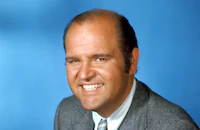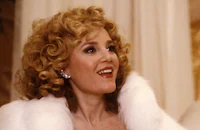Blazing Saddles

Brief Synopsis
Cast & Crew
Mel Brooks
Cleavon Little
Gene Wilder
Slim Pickens
Harvey Korman
Dom Deluise
Film Details
Technical Specs
Synopsis
When the new railroad is scheduled to go through the frontier town of Rock Ridge, corrupt State Attorney General Hedley Lamarr sends thugs to scare the townspeople off the newly valuable land so he can buy it himself. This causes the citizens to demand that the Governor appoint a new sheriff to protect them. Lamarr convinces the simple-minded Governor to appoint a black railroad worker named Bart, thinking that the racist townsfolk will either move away or lynch him. But the quick-witted, urbane Bart and his alcoholic sidekick The Waco Kid set out to win over the town.
Director

Mel Brooks
Cast

Cleavon Little

Gene Wilder

Slim Pickens

Harvey Korman

Dom Deluise
John Hillerman

Mel Brooks

David Huddleston
George Furth

Alex Karras

Liam Dunn
Claude E Starrett

Madeline Kahn
Crew
Andrew Bergman
Andrew Bergman
Andrew Bergman
Joseph Biroc
Joseph Biroc
Mel Brooks
Mel Brooks
Gene S Cantamessa
John Chulay
Danford B. Greene
Michael Hertzberg
John C. Howard
John Morris
John Morris
Richard Pryor
Norman Steinberg
Alan Uger
Peter Wooley
Videos
Movie Clip



Trailer
Hosted Intro
Film Details
Technical Specs
Award Nominations
Best Editing
Best Song
Best Supporting Actress
Articles
Blazing Saddles
Blazing Saddles was a huge box-office hit and remains the highest-grossing Western of all time, though critical reviews were mixed when it first opened theatrically. Newsweek proclaimed the picture an "insane take-off on the classic Western. . . .triggering laughs that measure a full ten on the Richter scale." Variety wasn't so sure, however, finding the R-rated language "incessant" and that "if comedies are measured solely by the number of yocks they generate from audiences, then Mel Brooks' 'Blazing Saddles' must be counted a success. . . .Few viewers will have time between laughs to complain that pic is essentially a raunchy, protracted version of a television comedy skit."
The film's opening theme song, "Blazing Saddles," is a "Mule Train" send up. It's sung by Frankie Laine (the western singer who made "Mule Train" a hit) and sets the stage for a tongue-in-cheek parody of the genre. Reportedly, Brooks put out the call for a Frankie Laine-like singer, never imagining he'd get the real McCoy when the singer showed up in his office saying he'd like to do it himself.
Gene Wilder plays the Waco Kid, Sheriff Bart's one ally. Gig Young was originally cast in the role (John Wayne had already turned the part down as being too silly), but on the day of the scene in which the Kid, drunk in his cell, first meets Bart, Young, a certified drinker himself, was doing some serious method acting and was carried away with the tremors. Wilder, who had reportedly begged Brooks for the part early on, was on a plane a day later to take over.
The role of Bart was originally supposed to go to Richard Pryor, one of the film's writers, but the actor/comedian was considered too controversial at the time, and Brooks couldn't secure financing with Pryor in the film, so the role went to the less problematic Little.
Blazing Saddles is rife with cameos. Naturally, Brooks is everywhere (he also wrote three songs for the soundtrack) - as Governor LePetomane (the stage name of a French stage performer famous for punctuating his stories with flatulence) and as a Jewish Indian Chief who speaks Yiddish and a WWI aviator. Gilda Radner (later to become Gene Wilder's wife) has a cameo in the church, and Count Basie is the bandleader Bart passes in the desert.
Brooks enjoyed working with a repertoire of actors during this period. Harvey Korman (Hedley Lamarr) is a long-time Brooks fixture, appearing in High Anxiety (1978), History of the World, Part 1 (1981) and Dracula: Dead and Loving It (1995). Reportedly, actress Hedy Lamarr sued Brooks over the use of the name Hedley Lamarr and settled out of court. Madeline Kahn and Wilder would also star in Brooks' Young Frankenstein (1974) and Wilder, of course, had his first major screen role in Brooks' debut feature, The Producers, in 1968.
For sheer offensive-jokes-per-minute Blazing Saddles may still hold the world record though the recent Scary Movie (2000) probably comes close. Still, many hail Blazing Saddles as an unflinching satire of racism, while others dismiss the film as an excuse to revel in fart jokes. And let's not forget that the film was nominated for three Oscars - Best Supporting Actress (Madeline Kahn, doing a hilarious takeoff on Marlene Dietrich in Destry Rides Again, 1939), Best Editing and Best Song. But whatever the opinion, Blazing Saddles has staked its claim in film history as a one-of-a-kind take on the American West.
by Emily Soares

Blazing Saddles
Blazing Saddles: 30th Anniversary Special Edition on DVD
Blazing Saddles (1974) was a huge box-office hit and remains the highest-grossing Western of all time, though critical reviews were mixed when it first opened theatrically. Newsweek proclaimed the picture an "insane take-off on the classic Western. . . .triggering laughs that measure a full ten on the Richter scale." Variety wasn't so sure, however, finding the R-rated language "incessant" and that "if comedies are measured solely by the number of yocks they generate from audiences, then Mel Brooks' 'Blazing Saddles' must be counted a success. . . .Few viewers will have time between laughs to complain that pic is essentially a raunchy, protracted version of a television comedy skit."
The film's opening theme song, "Blazing Saddles," is a "Mule Train" send up. It's sung by Frankie Laine (the western singer who made "Mule Train" a hit) and sets the stage for a tongue-in-cheek parody of the genre. Reportedly, Brooks put out the call for a Frankie Laine-like singer, never imagining he'd get the real McCoy when the singer showed up in his office saying he'd like to do it himself.
Gene Wilder plays the Waco Kid, Sheriff Bart's one ally. Gig Young was originally cast in the role (John Wayne had already turned the part down as being too silly), but on the day of the scene in which the Kid, drunk in his cell, first meets Bart, Young, a certified drinker himself, was doing some serious method acting and was carried away with the tremors. Wilder, who had reportedly begged Brooks for the part early on, was on a plane a day later to take over.
The role of Bart was originally supposed to go to Richard Pryor, one of the film's writers, but the actor/comedian was considered too controversial at the time, and Brooks couldn't secure financing with Pryor in the film, so the role went to the less problematic Little.
Blazing Saddles is rife with cameos. Naturally, Brooks is everywhere (he also wrote three songs for the soundtrack) - as Governor LePetomane (the stage name of a French stage performer famous for punctuating his stories with flatulence) and as a Jewish Indian Chief who speaks Yiddish and a WWI aviator. Gilda Radner (later to become Gene Wilder's wife) has a cameo in the church, and Count Basie is the bandleader Bart passes in the desert.
Brooks enjoyed working with a repertoire of actors during this period. Harvey Korman (Hedley Lamarr) is a long-time Brooks fixture, appearing in High Anxiety (1978), History of the World, Part 1 (1981) and Dracula: Dead and Loving It (1995). Reportedly, actress Hedy Lamarr sued Brooks over the use of the name Hedley Lamarr and settled out of court. Madeline Kahn and Wilder would also star in Brooks' Young Frankenstein (1974) and Wilder, of course, had his first major screen role in Brooks' debut feature, The Producers, in 1968.
For sheer offensive-jokes-per-minute Blazing Saddles may still hold the world record though the recent Scary Movie (2000) probably comes close. Still, many hail Blazing Saddles as an unflinching satire of racism, while others dismiss the film as an excuse to revel in fart jokes. And let's not forget that the film was nominated for three Oscars - Best Supporting Actress (Madeline Kahn, doing a hilarious takeoff on Marlene Dietrich in Destry Rides Again, 1939), Best Editing and Best Song. But whatever the opinion, Blazing Saddles has staked its claim in film history as a one-of-a-kind take on the American West.
For the 30th Anniversary Special Edition of Blazing Saddles, Warner Video has given the film a brand new transfer in the 2.35:1 anamorphic widescreen format and it's a vast improvement over the previous DVD version which was marred by numerous imperfections and an overall graininess. Among the many extra features, only two are recycled from earlier editions - "Back in the Saddle," a "making of" documentary (first appeared on the VHS special edition) and Mel Brooks' fact-filled commentary from the earlier DVD which does not run the length of the film; it's only 54 minutes or so.
The other extra features include the featurette "Intimate Portrait: Madeline Kahn," seven alternate scenes from the movie that were used in the TV version, the original trailer and a failed 1975 TV pilot, "Black Bart," based on Cleavon Little's character in Blazing Saddles but with Louis Gossett, Jr. in the title role.
For more information about Blazing Saddles, visit Warner Video. To order Blazing Saddles, go to TCM Shopping.
by Emily Soares
Blazing Saddles: 30th Anniversary Special Edition on DVD
Quotes
Oh, baby, you're *so* talented... and they are *so* dumb.- Bart
Repeat after me: I...- Hedley Lamarr
I...- Men
...your name...- Hedley Lamarr
...your name...- Men
Shmucks.- Hedley Lamarr
Is that a ten-gallon hat, or are you just enjoying the show?- Lili Von Shtupp
A wed wose, how womantic.- Lili Von Shtupp
I must have killed more men than Cecil B. DeMille.- Jim
Trivia
The role of Bart was intended for Richard Pryor, but due to the controversial nature of Pryor's stand-up routines of the day and his background, 'Brooks, Mel' couldn't secure financing for the project with Pryor in that role. So Pryor was made a co-writer of the script, and Cleavon Little played Bart.
Production began with Gig Young as the Waco Kid. On the first day of shooting, the scene where the drunk Waco Kid hangs from a bunk asking of Bart is black, Young revealed he really was drunk and proceeded to undergo a physical collapse on set. Brooks shut down production for a day and Gene Wilder flew cross country to take over the role.
In the shot where the showbill for "Lili von Schtupp, The Teutonic Titwillow" appears, the tune played on the honky-tonk piano in the background is "Springtime for Hitler" from Producers, The (1968), also directed by Brooks.
Scriptwriter Andrew Bergman originally named the lead character "Tex X".
Director 'Brooks, Mel' plays a character called "Le Petomane", which was the stage name of a popular French performer (Joseph Pujol) from the beginning of the 20th century. His specialty was telling stories punctuated with flatulence.
Miscellaneous Notes
Released in United States February 1974
Released in United States June 16, 1989
Released in United States Winter February 7, 1974
Shown at Film Forum in New York City June 16, 1989.
Released in United States February 1974
Released in United States Winter February 7, 1974
Released in United States June 16, 1989 (Shown at Film Forum in New York City June 16, 1989.)
















